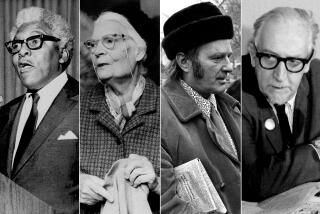Paterson on Refusing to Go to Saudi Arabia
- Share via
I was a Marine judge advocate and served for a time as a military judge. In my 28-year Marine Corps career, I read many letters like the one by Paterson, written by young men desperately trying to persuade anyone in authority that they should be classified as conscientious objectors.
The problem that I faced as a military judge lay in trying to determine whether the accused’s conversion to pacifism was based upon sincere and deeply held beliefs or was merely an opportunistic ploy for the purpose of evading combat or other unpleasant duty, or, perhaps, was simply a manifestation of the accused’s desire to obtain the benefits of military service while avoiding the concomitant obligations. One thing is clear: absent an admission by the accused, there is no way to tell for sure.
There usually are, however, certain clues to which the trier of fact can look. Paterson’s column contains numerous clues as to his true feelings. Principal among them are the facts that he voluntarily enlisted in the Marine Corps; accepted his pay and other benefits for four years and five months, and then decided to become a conscientious objector only after getting orders to an unpleasant and potentially dangerous place.
RONALD J. KAYE
Colonel USMC (Ret.)
Carlsbad

